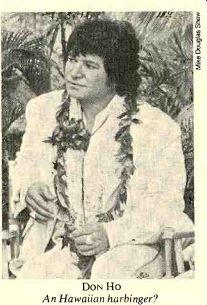
by STEVE SIMELS
The Pop Beat
NEXT BIG THING HAWAIIAN?
IN my capacity as Popular Music Editor here I at what Joel Vance (in a thinly disguised ploy to get himself a raise) refers to as the "Best of All Possible Music Magazines," I have, over the course of the last few years, received a lot of interesting letters from readers. Some are remarkably thoughtful reflections on things we've published (believe me, there are a lot of armchair rock critics out there who could put us professionals to shame), some are angry-fan outbursts, some are threats, and a few are propositions (my favorite is the one from a girl in Arizona who in formed me, pithily, "Face it, Steve, I'm a doll"). But recently I received one with a question in it that, to put it mildly, threw me for a loop.
"Where," the correspondent inquired, "do you think pop music is going in the next few years?" After spending a few sleepless nights wrestling with that question and coming up with nothing more cogent than "to hell in a hand cart," I admitted that I was licked, and so, tail between my legs, I availed myself of the sage advice of James Goodfriend, STEREO REVIEW'S Music Editor. Jim may have noticed that I was unkempt, disheveled, and mumbling incoherently, but, as this is how I appear on most good days, he waited for me to make the first move.
"Jim," I finally cried in desperation, "they're on to me. The readers want to know where pop music is going, and I haven't a clue. What do I tell them?" Jim smiled at me with the air of a Borgia prince reaching for his poison ring.
"Hawaiian music." "Hawaiian music?" I repeated, feeling like Dustin Hoffman in The Graduate.
"Sure," he said. "For the last thirty years, every time things have gotten slow in the record business, some executive predicts that Hawaiian music will be the Next Big Thing. It never fails." Now, I don't know if Jim was aware that Don Ho (of Tiny Bubbles fame) has just got ten his very own daytime show on ABC, but the bizarre thing is that he just may be right.
In fact, Hawaiian music is just as reasonable a prediction for the N.B.T. as reggae, jazz rock, c-&-w, or anything else you could care to name for the simple reason that it is highly unlikely that anything will be the Next Big Thing in pop while we are still young enough to enjoy it.

DON Ho: An Hawaiian harbinger?
That sounds awfully pessimistic, I know, but consider the facts. For starters, here we are closing in on the end of the Seventies, and as yet we have not witnessed the emergence of any truly pervasive new musical styles or of any individual artists capable of exerting an across-the-boards influence on both music and pop culture. Two of the most visible stars of the decade, for example--David Bowie and Bette Midler--have been commercially successful, and they have been influential in the sense that they have inspired a host of imitators, but neither one of them, after the initial novelty wore off, could be said to have changed the way we live. The most that could be said about them-and of all Seventies stars, from Springsteen to Elton to the Eagles to Patti Smith, which is certainly a mixed bag-is that they've given us new wrinkles, small refinements of things that have gone be fore. They've pursued their own visions, to be sure, but they are hardly revolutionaries.
Second, all of the profound social and musical changes of the recent past-the emergence of the big bands and then the crooners in the Thirties and Forties, the rise of rock and-roll in the Fifties, the whatever-the-hell-it-was of the Sixties-have been largely youth-oriented phenomena. There are, how ever, a lot fewer teenagers today, percentage-wise, than there were ten years ago; their buy ing power, quite aside from the state of our national economy, has consequently de creased; and by all accounts they are, as a group, despite the dizzying developments of the last few years, a singularly jaded and complacent lot. Depending on the degree of your scorn for youthful folly, that may or may not give you hope, but it is unlikely that we will be seeing soon again a bunch of kids ripping out theater seats after hearing a new song.
WHAT we can expect, I think, is more of what we've been getting lately-disco. It may or may not be significant, but it is at least interesting that the only "new" music peculiar to the Seventies with any broad commercial appeal is dance music, music addressed not to the head (or even the heart) but to the feet, to the automatic motor response that is the real engine behind any dance craze. But its acceptance has been so easy, so natural, and so unhurried (even though many of its promoters are hurrying for the Big Bucks) that it is un likely to be building up any kind of aesthetic backlash.
Last, and most crucial, the record industry in 1977 has grown to the point where, to put it simply, an Elton John is worth more to MCA than a Jaws. With stakes like that, the music moguls are understandably unwilling to risk money on anything not demonstrably marketable. An expensive flop like the notorious Martha Reeves album Richard Perry produced is to be avoided like another Great Gatsby, and that is a situation not exactly conducive to the greening of whatever boat-rocking young geniuses are still lurking out there in the musical wilds. At the same time, the number of people buying records has in creased so that only a small segment of the total audience is necessary to support-profitably-almost any kind of artist. The c-&-w folk don't listen to jazz, disco-maniacs couldn't care less about John Denver, Frampton fans won't scream for Earth, Wind and Fire, and Eagles rooters aren't in the Kiss army, yet they all sell. The result is an incredibly compartmentalized listening audience, with everyone blissfully unaware of what his neighbors are into, and that kind of parochial ism, while profitable for record companies and artists, is unhealthy even in the short run, most unlikely to produce any cross-fertilization or significant new musical discoveries.
So where do we go from here? The answer seems obvious: headfirst into The Bland. Audiences are unwilling to stretch their ears, young people regard music as a kind of back ground activity slightly less important than television, and the record companies can't afford to take chances (they never really wanted to anyway). Certainly there are and will continue to be exceptions; we will have a few fluke successes and a surprise break through or two. But these will only prove the rule, and barring something catastrophic like a war or a depression or the Second Coming, it's hard to imagine the overall picture changing in any significant way. Hawaiian music? Why not? Do you really think it's such a leap from the New Decadence to Grass Skirt Chic?
Also see:
LETTERS TO THE EDITOR (Feb 1977)
AUDIO BASICS: The Greater Good
Source: Stereo Review (USA magazine)